Key Takeaways:
- GPS fleet tracking empowers you to address potential challenges stemming from not knowing where your drivers are. This allows you to streamline fleet operations, boost productivity, and promote driver accountability.
- Thanks to GPS tracking technology, you can get immediate alerts when there are mechanical problems, allowing you to address vehicle issues before they escalate.
- Tracking vehicles and heavy equipment with sensor-enabled GPS trackers can also help you monitor fuel usage, identify areas for improvement, and take steps to reduce fuel wastage and save money.
Although GPS tracking has been around for some time, recent advancements in technology have reduced the price and increased the capabilities of GPS tracking solutions.
This made GPS tracking of trucks, vehicles, and heavy equipment even more beneficial for construction companies.
The majority of these benefits arise from managers being able to efficiently address some frequently encountered fleet management issues, such as driver accountability, timely maintenance, fuel wastage, equipment theft, and administrative workload.
In this article, we’ll explore five common problems faced by construction companies and how GPS fleet tracking can help you effectively solve them.
In this article...
Not Knowing Where Your Drivers Are
Right out of the gate, GPS fleet tracking tackles one of the most pressing challenges for construction companies:
The lack of real-time visibility into the location of their drivers and operators (i.e., their vehicles and heavy equipment).
Simply put, it’s much harder to monitor and coordinate fleet activities without GPS tracking, and such issues can lead to project delays, missed deadlines, and dissatisfied clients.
For instance, it’s challenging to ensure that drivers are adhering to designated routes, safety protocols, and work schedules.
This lack of real-time information can result in unauthorized vehicle use, extended breaks, or even misuse of company resources.
And that’s where GPS tracking solutions, such as our GoCodes Asset Tracking, come in.
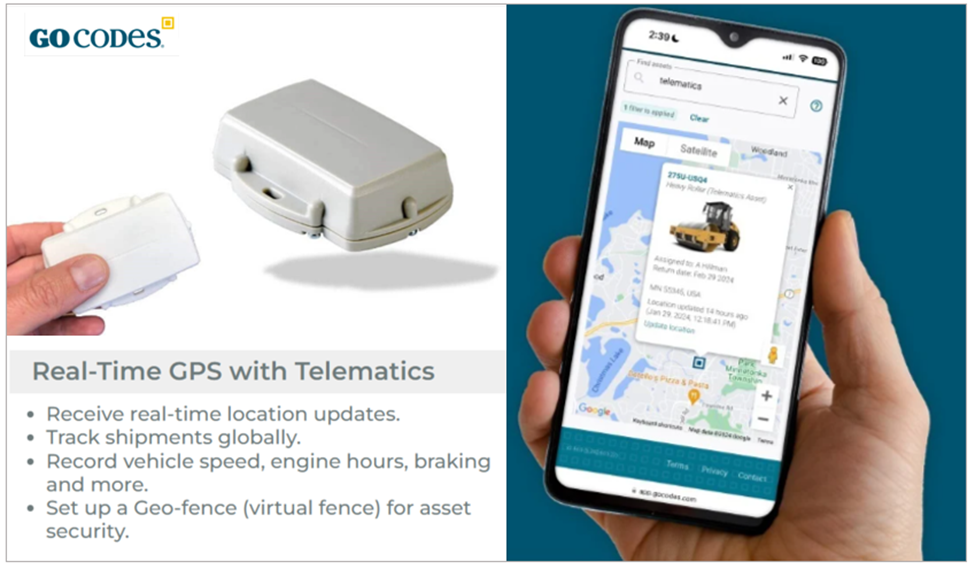
As illustrated, after a simple and quick installation of GPS trackers, construction companies gain real-time visibility into the location of their entire fleet.
Moreover, these minute-by-minute GPS location updates can be received and viewed on any internet-connected device, such as a smartphone, tablet, laptop, or desktop.
That way, managers can, at any time and from any place, pinpoint the exact whereabouts of each vehicle or piece of equipment and monitor their movement in real time.
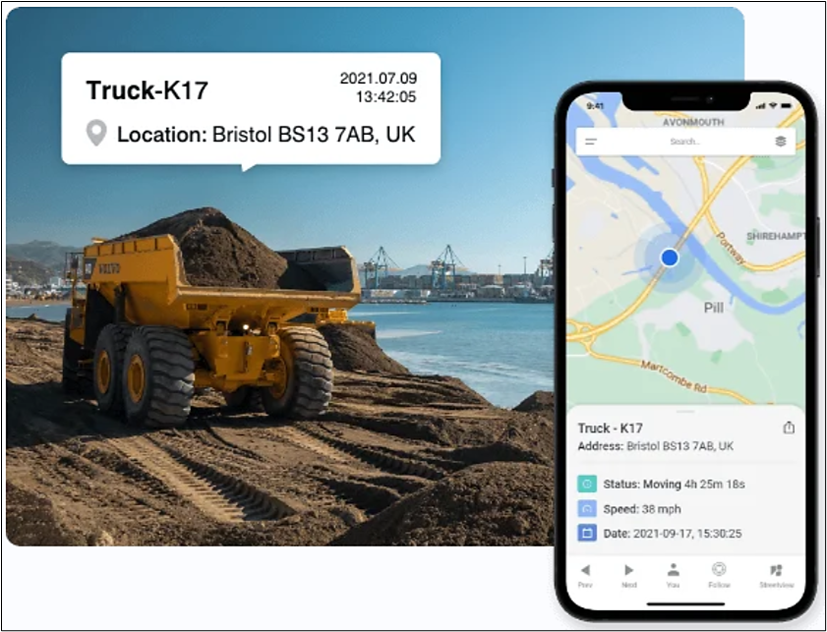
This level of insight allows for proactive decision-making and effective resource allocation.
For example, if there’s an unexpected pickup of construction materials or other supplies, you can easily access the system, locate the nearest vehicle, and reroute it to perform this task.
Similarly, if a vehicle or a piece of equipment breaks down on a job site, you can immediately find out where their nearest replacement is and dispatch it promptly, thus minimizing staff downtime and efficiently addressing the issue.
Overall, GPS fleet tracking helps you tackle a range of potential problems arising from not knowing where your drivers are, enabling you to optimize fleet operations, enhance productivity, and increase driver accountability.
Finding Out About Vehicle Issues Too Late
When your GPS trackers are connected to internal vehicle diagnostics or external sensors, you can receive alerts and address vehicle and equipment issues as they arise.
This real-time monitoring capability is invaluable for construction companies, as it prevents the all-too-common scenario of discovering issues only after they’ve escalated into breakdowns and costly repairs.
Without sensor-enabled GPS trackers, equipment maintenance typically relies on manual inspections or reactive responses to reported problems.
However, by the time these issues are identified, they may have already caused significant damage, which makes repairs more expensive and downtime longer.
Conversely, when the GPS tracker is linked to built-in or subsequently installed sensors, managers and drivers receive instant notifications when a vehicle exhibits signs of mechanical issues or requires routine maintenance.
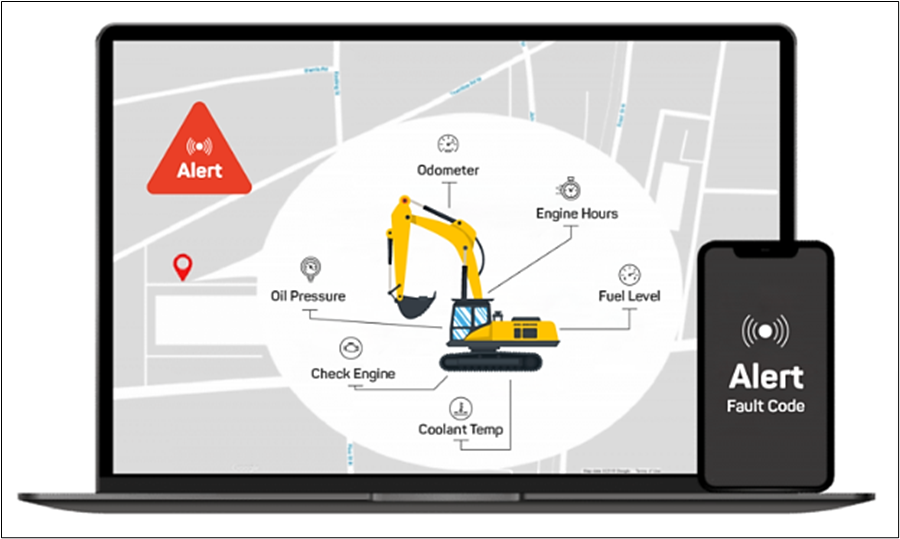
For instance, if the engine of the above-illustrated excavator begins to overheat or its oil pressure drops below a certain threshold, the GPS tracking system will send an alert indicating the relevant engine fault code.
Since modern construction vehicles and heavy equipment usually come with a range of their own sensors and can be further equipped with various types of external sensors, the number of issues that can be detected is practically endless.
For example, tire pressure sensors can alert you if your truck’s tires are over- or underinflated.
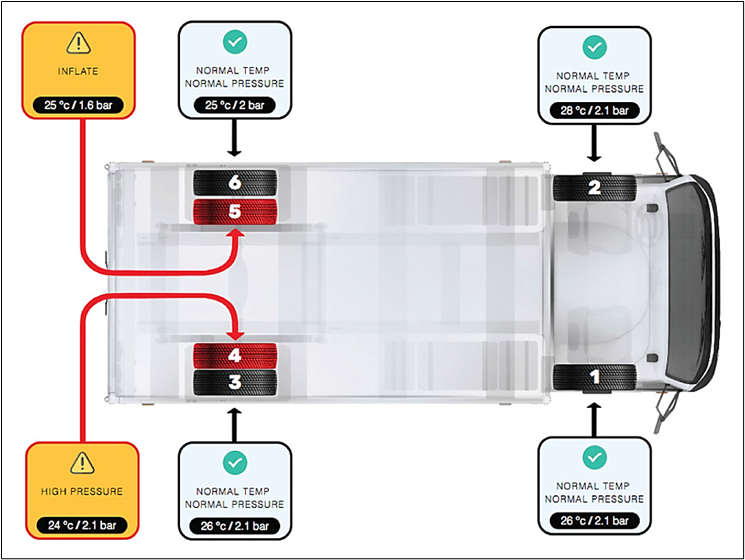
Regardless of what vehicle parameters your GPS tracking system is monitoring, such alerts allow for prompt intervention, enabling you to take a proactive approach to preventive maintenance.
Another problem solved by a GPS fleet tracking system involves scheduling and performing routine maintenance (e.g., oil and filter change) based on equipment usage, the manufacturer’s warranty terms, or specific project requirements.
Since all the data on performed maintenance and repairs is recorded by the tracking software, managers can analyze historical data to predict potential issues before they escalate.
From there, they can schedule the required maintenance tasks and set up automatic alerts to be received by the assigned service technicians.
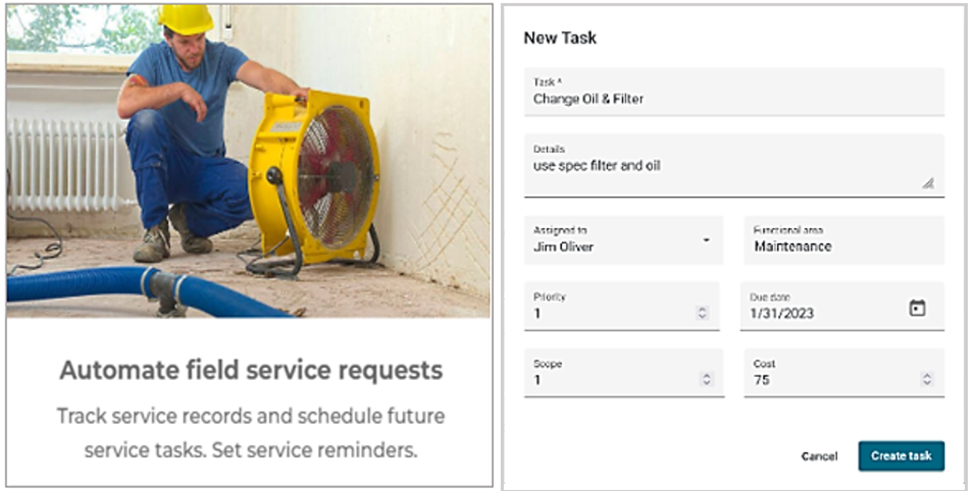
That way, maintenance staff will be timely informed of their tasks and can properly prepare for them, thus ensuring that critical maintenance tasks are never overlooked.
By staying ahead of maintenance needs, managers can ensure reliable fleet performance, streamline operations, and protect their company’s bottom line.
In summary, GPS fleet tracking equipped with vehicle diagnostics and sensor integration empowers construction companies to address vehicle issues promptly, minimize downtime, and optimize maintenance practices.
Wasting Money on Fuel
Fuel consumption is one of the costliest parameters in any fleet’s budget which can account for as much as 60% of all fleet costs.
In view of this, it’s not surprising that most construction companies are worried about their fuel spend and looking for ways to reduce fuel expenses.
When vehicles and heavy equipment are tracked with sensor-enabled GPS trackers, this allows managers to monitor fuel consumption patterns, recognize opportunities for improvement, and implement measures to stop wasting money on fuel.
For starters, a GPS tracking system can monitor engine parameters and detect maintenance issues that might increase fuel wastage.
Here are a few examples of how maintenance decisions can affect fuel mileage:
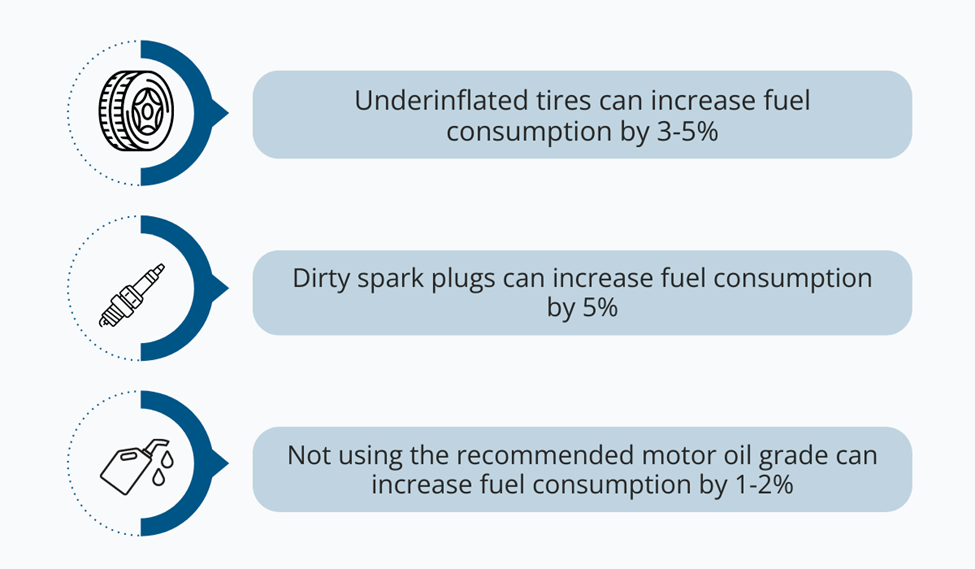
An even more important problem that can be tackled with the help of GPS fleet tracking is the way drivers are using the vehicles.
In other words, GPS trackers can record all instances when drivers are speeding, stepping on the brake too hard, accelerating harshly, or leaving their vehicle to idle unnecessarily.
As illustrated below, addressing such behaviors can have a significant impact on reducing fuel wastage:
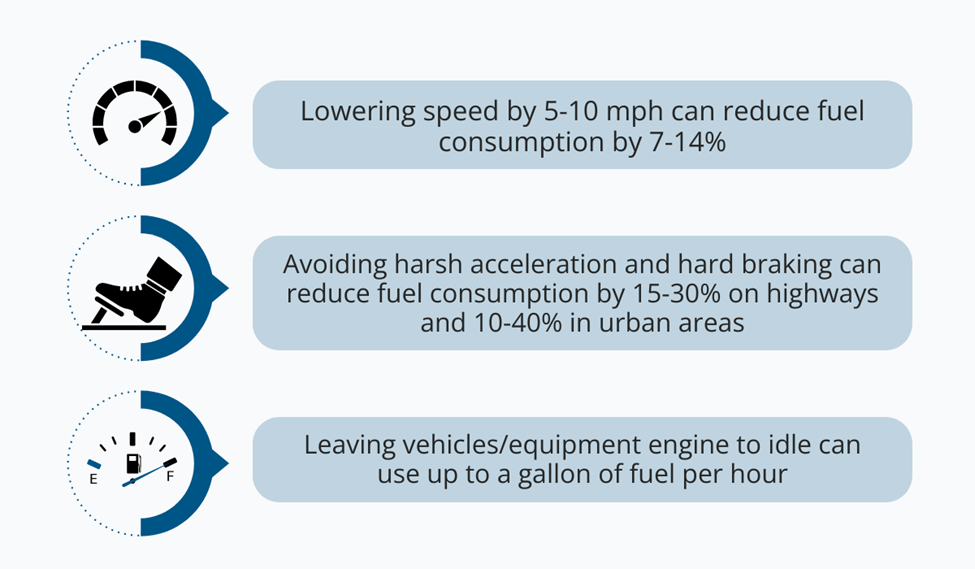
Therefore, GPS fleet tracking allows managers to detect such fuel-wasting driving behaviors and devise methods to minimize them, whether through direct feedback while driving (automatic in-vehicle alerts), coaching programs, or driver incentives.
Another fuel-saving measure enabled by GPS tracking is route optimization, i.e., analyzing the routes taken and optimizing them to reduce fuel consumption.
This may include suggesting routes that are not necessarily shorter but do not involve steep climbs or congested traffic.
To recap, the abundance of data provided by GPS tracking empowers you to take appropriate measures to stop wasting money on fuel.
That’s why construction companies frequently highlight GPS fleet tracking as one of the most significant cost-saving tools.
Experiencing Equipment Theft
Due to their high value, construction vehicles and heavy equipment are attractive targets for thieves.
However, GPS fleet tracking can, alongside other security measures, help construction companies prevent theft.
According to the National Equipment Register (NER), the number of equipment thefts in the U.S. will in 2024 likely exceed the national average of 10,000-11,000 thefts a year.
Since the average value of stolen heavy equipment and vehicles is between $35,000 and $45,000, this means that companies lose about $500 million a year (when delays, downtime, and replacement costs are added).
To illustrate, here are NER’s equipment theft trends recorded in the first half of 2023:
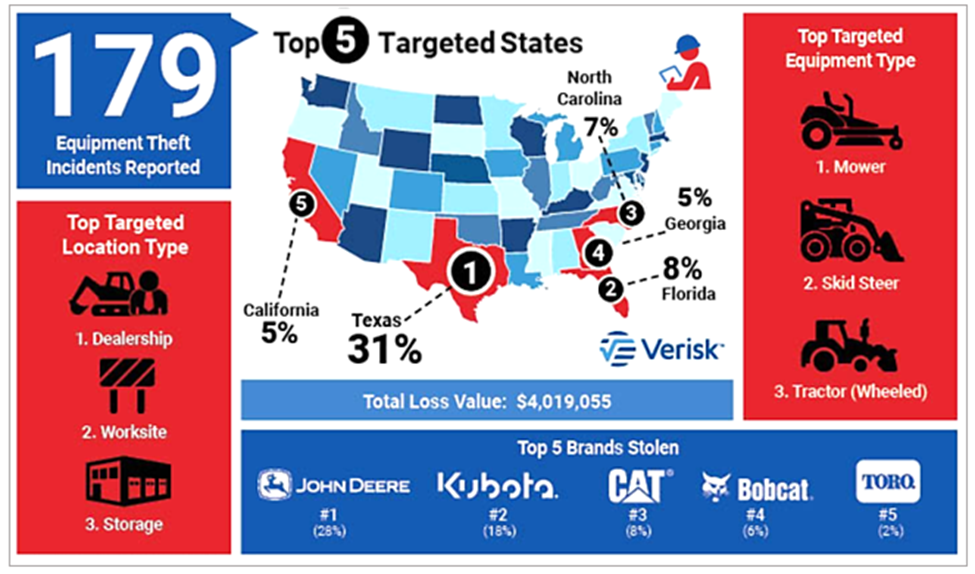
Given the above, it’s clear that GPS trackers are a powerful tool for both preventing theft and assisting authorities in locating stolen equipment.
If it’s well-hidden and hard to remove or tamper with, and/or the equipment has another dummy tracker that will fool the thieves, the tracker will tell you where your missing equipment is in real time.
That way, you can report theft to the police along with the precise GPS position of your equipment.
Another anti-theft measure enabled by GPS trackers and fleet management software is geofencing.
This feature of your GPS fleet tracking system allows you to create invisible, virtual boundaries around predesignated zones, such as specific job sites, storage yards, or even planned transport routes.
As shown below, if equipment crosses the set boundaries, the software system will immediately send a loss alert, enabling you to promptly investigate the matter and, in case of theft (rather than just human error or intended unauthorized use), notify law enforcement.
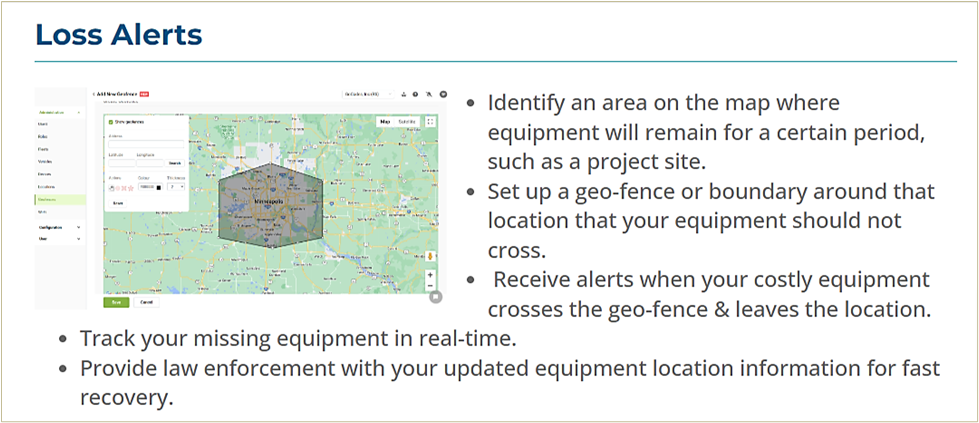
Although the described GPS tracking features are great for theft prevention and quick recovery, they should be supported by general anti-theft signage, company logos, and specific identifiers, i.e., asset tags.
These methods are affordable and can further contribute to minimizing theft and facilitating recovery by enabling easy equipment identification and proof of ownership.
Moreover, asset tags (usually QR code labels) can be attached to all your other equipment, tools, and other items that are either too small or not valuable enough to warrant real-time GPS trackers.
Alongside acting as unique equipment identifiers, these QR code tags, when scanned with a smartphone or tablet, will use the scanning device’s GPS locator to record the asset’s GPS position.
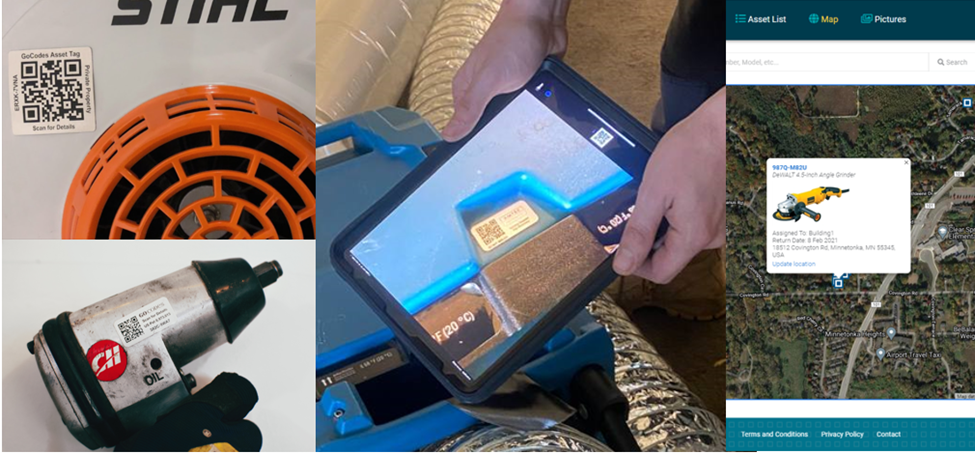
This scan-based GPS tracking allows you to see the last-scanned location of a lost or stolen asset, and also enables you to set up an automated asset check-in/check-out system, ensuring that you always know who is using your equipment and tools.
Naturally, this functionality increases worker accountability, thereby preventing not only internal theft but also negligent handling of equipment and tools.
Overall, a smart blend of active GPS tracking and other security measures allows you to protect your fleet and other valuable assets from theft, help in their recovery, and provide proof of ownership.
Spending Too Much Time on Paperwork
Construction companies are typically burdened with extensive and time-consuming paperwork related to fleet management, such as mileage logs, driver activity reports, and vehicle maintenance records.
However, a GPS fleet tracking system can digitize, automate, and streamline these paper- or spreadsheet-based administrative tasks, freeing up valuable time and resources for more critical operational activities.
For instance, instead of relying on drivers to accurately record their miles traveled, the system can automatically capture and log mileage data in real time.
This eliminates the need for cumbersome paper logs and reduces the risk of errors or inaccuracies.
Similarly, GPS tracking software can be used to generate comprehensive reports on a series of fleet management tasks, such as drivers’ hours of service and equipment’s operating hours, fuel consumption, and utilization rates.
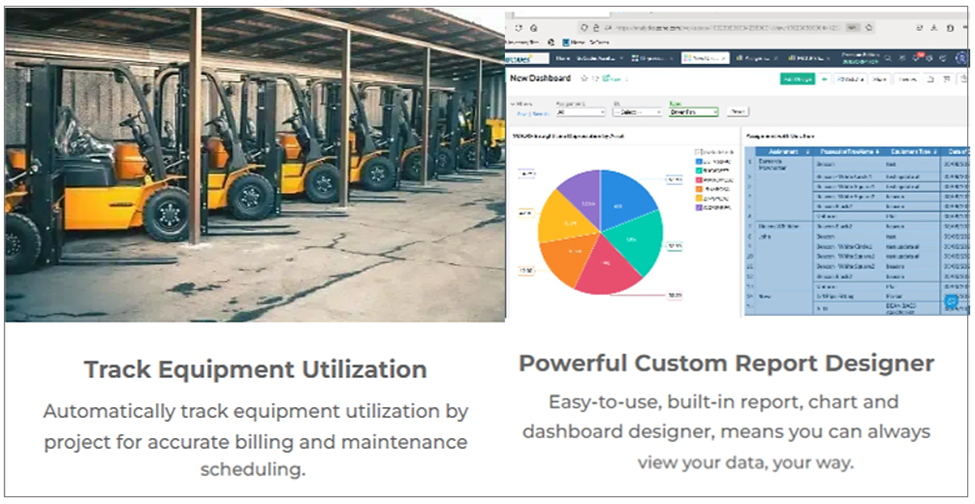
Coupled with the software’s data analytics features, such reports provide valuable insights into fleet performance and can serve as proof of compliance with regulatory requirements, such as hours of service or fuel tax regulations.
As mentioned, GPS fleet tracking also facilitates proactive vehicle and equipment maintenance management while reducing paperwork.
More precisely, maintenance records and service histories are automatically recorded and stored digitally, eliminating the need for manual record-keeping and paperwork.
But he list of what administrative processes GPS tracking software can digitize and automate does not stop with these examples.
In fact, it extends to many other tasks, such as fleet scheduling, maintenance planning, project billing, and inventory management.
In summary, a GPS fleet tracking solution can eliminate or minimize the time your staff spends on paperwork for a range of fleet management tasks, thus allowing them to focus on more productive and profitable tasks.
Conclusion
Overall, it’s safe to say that GPS fleet tracking stands as a transformative solution for construction companies that can efficiently address key fleet management challenges, from driver accountability to administrative burden.
By providing real-time visibility, automating tasks, and enabling proactive decision-making, this technology empowers construction companies to optimize fleet management processes, maximize productivity, and minimize costs.
Ultimately, a well-selected and properly used GPS tracking solution can significantly enhance operational efficiency, improve resource utilization, and drive overall business success.









